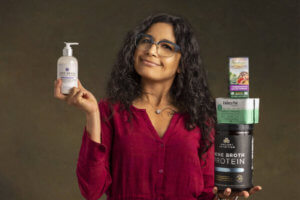10 Questions with a Supplement Expert: Turnip Truck’s Jasmin Rosil


by Jenna Bratcher, StyleBlueprint Nashville’s Associate Editor and Lead Writer. Read the full article on Styleblueprint, here.
The subject of health is front and center these days, whether we’re considering socially distanced gatherings, grocery store outings, or sending our kids back to school. And while we still have a lot to learn about COVID-19, one thing is clear — keeping our bodies in tip-top shape is one of the best ways to fight against the virus. We asked some local experts to weigh in on a few of the best prevention practices and what we can do to ramp up our immune systems.
It’s a no-brainer that exercise is crucial to keeping your body physically fit, but how does it affect your immunity, and how much exercise do you really need? Having a consistent exercise routine is vital since it increases the circulation of immune cells and helps build immunity by reducing inflammation. Not to mention, exercise is a fantastic stress release, and stress is a major culprit in suppressing our immune systems.
The old saying “You are what you eat” rings true — healthy food makes for a healthier body. “A well-balanced diet can help us stay on the preventative side of many medical conditions and build the foundation for a healthy immune system, making us less susceptible to infections,” says Anna Smith, a registered dietitian nutritionist for Kroger Health. Eating a nutritionally balanced diet is the clear-cut answer, and following the USDA’s MyPlate method is recommended.
Vitamin C, vitamin D and zinc have all been shown to reduce healing time after infections and play a key role in building immunity, particularly to respiratory illnesses such as COVID-19. In fact, the National Institutes of Health published new evidence that suggests vitamin D plays a significant role in regulating the immune system, and studies also show that vitamin D deficiency may increase the risk of respiratory illnesses. So, how do you get the appropriate amount of vitamin D? Turnip Truck’s Health & Beauty Department Manager, Jasmin Rosil says, “Most Americans do not get enough from sunlight alone, so supplementation is a great tool to help us get enough of this essential vitamin. One of our favorite brands for vitamin D is Natural Factors. They are family-owned, and stringent quality control ensures their products are pesticide-free and non-GMO.”
Before adding any supplements to your healthcare routine, it’s important to do plenty of research, talk to your trusted healthcare provider and remember that, as Jasmin puts it, “All supplements are not created equally. Choosing a supplement with healthy (not harmful) ingredients is paramount.” Not to mention, nutrition starts with your daily diet, so it’s important to remember that supplements are meant to do just that — supplement. They aren’t intended to take the place of vitamin- and mineral-rich foods, which you should obtain through fresh produce. “If you are eating a diet rich in fruits, vegetables and other whole-nutrient sources, your multivitamin may be adequate,” offers Jasmin. “Consuming fresh and natural foods is the simplest, most complete way to lay the groundwork of daily nutrition.”
From physical to mental benefits, there are a lot of evident and indisputable advantages that come with a solid night of slumber. But did you know that immunity-boosting brain chemicals are also released while we sleep? Essentially, our bodies need sleep to fight off infection, and for the average person, this means a full seven to eight hours of sleep per night.
Being in shape is a whole-body affair, and we would be remiss to overlook the importance of mental health. Dr. Dana Verner, a mental health professional at Green Hills Family Psych, says, “Many people are surprised to learn just how strong the mind-body connection is — the health of our mind and body are inextricably intertwined. The same chemicals and hormones in the brain that affect the way we think and feel also affect our body and the way its systems function.”
Self-care takes many forms, and it’s at the epicenter of our wellness. Be it getting enough sleep, focusing on proper nutrition, exercising, taking health supplements, or finding a daily stress-release, our overall health depends on it. As Dr. Verner says, “Prioritizing self-care allows us to focus on what we can control during the chaos of pandemic life, rather than what we cannot.”
*It’s important to note that stress can become unmanageable despite our best efforts. If you or someone you know is feeling overwhelmed, Dr. Verner recommends reaching out for professional help from a counselor or therapist. “Thanks to the pandemic, telehealth restrictions have been lifted, and counseling is widely available and accessible in a safe way to those who need it,” she shares.